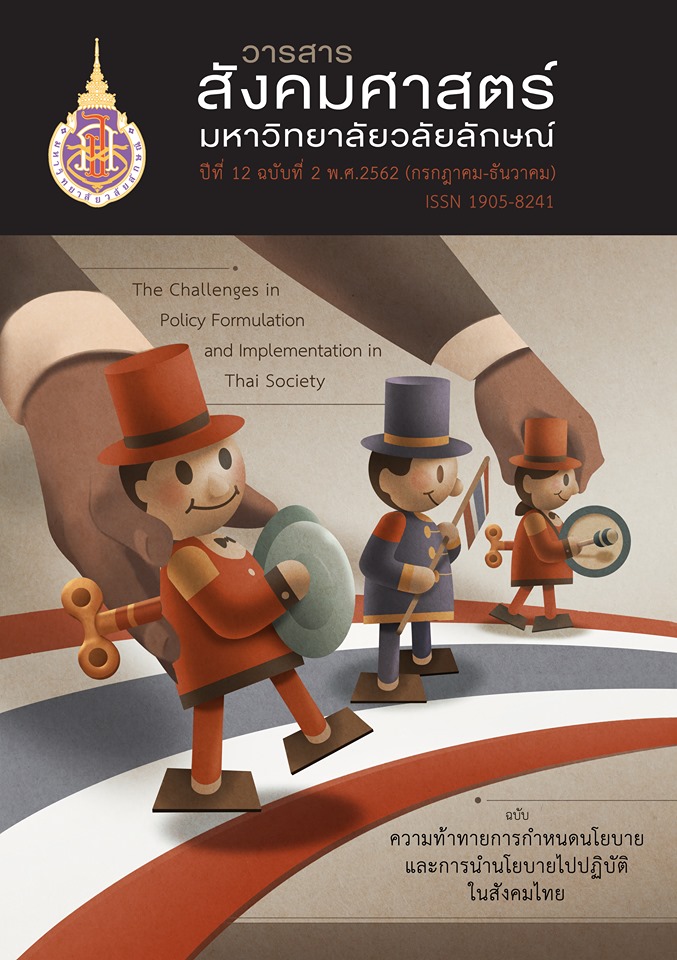The Development of Turkey’s Foreign Policy and the Relations with Southeast Asia Region from 1923 to 2017
Main Article Content
Abstract
Relations between Turkey and the Southeast Asia region had not been much deeply researched or mentioned because of the geopolitical distance, resulting in a seemingly distant relations. However, the trend has shifted with an increasing interest and more studies on these two regions, covering both historical and relationship dimensions. Evidences show historical relations between the Ottoman and many countries in Southeast Asia since the formation period of Republic of Turkey, and especially during the Justice and Development Party. Through opening to foreign countries policy, the Justice and Development Party employed the ‘soft power’ mechanisms that promoted positive images of Turkey in global stage, particularly within the Muslim-majority countries or areas. The changes of foreign policy in the past decades highlighted Turkey’s economic and social roles in various regions, namely, the Middle East, Middle Asia, Balkan and Africa. Even though Turkey has recently turned to use military mechanism due to the regional political instability, it continues to use foreign policy in search for its position in the world. As Southeast Asia has become more prominent, the ‘Look East Policy’ of Turkey also turns to this region. This article aims to emphasize Turkish roles in various dimensions in Southeast Asia, including economics, security, diplomacy, and humanitarian aids. Turkey has been brought closer to Southeast Asia region despite the presence of some challenges in political situations of either Turkey or some countries in the area.
Article Details
Copyright: CC BY-NC-ND 4.0
References
Atlı, A. (2013). Turkey and Indonesia: Historical roots, contemporary business links. Retrieved from https://www.mei.edu/content/turkey-and-indonesia-historical-roots-contemporary-business-links
Benhaïm, Y., & Öktem, K. (2015). The rise and fall of Turkey’s soft power discourse. European Journal for Turkish Studies, 21, 1-24.
Bozdağlioğlu, Y. (2004). Turkish foreign policy and Turkish identity: A constructivist approach. Routledge.
Bozdağlioğlu, Y. (2008). Modernity, Identity and Turkey's Foreign Policy. Insight Turkey, 10(1), 55-75.
Cevik, B.S., & Seib, P. (2015). Turkey’s public diplomacy. New York: Palgrave Macmillan.
Development Initiatives. (2016). Global Humanitarian Assistance Report 2016. Retrieved from https://www.globalhumanitarianassistance.org/wp-content/uploads/2016/07/GHA-report-2016-full-report.pdf
Dicle, B. (2008). Factors driving Turkish foreign policy (Master thesis). Louisiana State University.
Esenbel, S., & A. Atlı. (2013). Turkey’s changing foreign policy stance: Getting closer to Asia?. Retrieved from https://www.mei.edu/content/turkey%E2%80%99s-changing-foreign-policy-stance-getting-closer-asia
Gülseven, E. (2010). Identity security and Turkish foreign policy in the post-cold war period: Relations with the EU, Greece and the Middle East (Doctoral dissertation, School of Social Sciences).
Kadı, I. (2017). The Ottoman Empire and the Kingdom of Siam through the Ages. Bangkok: Institute of Asian Studies, Chulalongkorn University.
Kalın, İ. (2011). Soft Power and Public Diplomacy in Turkey. Perceptions: Journal of International Affairs, 16(3), 5-23.
Keyman, E.F. (2017). A new Turkish foreign policy: towards proactive “Moral Realism”. Insight Turkey, 19(1), 55-69.
Laçiner, S. (2003). Özalism (Neo-Ottomanism): An alternative in Turkish foreign policy? Journal of Administrative Sciences, 1, 1-2.
Ministry of Foreign Affairs. (2018). Turkey’s relations with the association of Southeast Asian Nations (ASEAN). Retrieved from https://www.mfa.gov.tr/asean.en.mfa
Reid, A. (2005). The Ottomans in Southeast Asia. Asia Research Institute, National University of Singapore.
Sattar, Y. (2018). Güney Doğu Asya’nin Çatişma Bölgelerinde Türkiye’nin Varliği ve Etkisi. (Doctoral dissertation). Istanbul: Istanbul University.
The British Academy. (2017). Islam, Trade and Politics across the Indian Ocean. Retrieved from https://www.ottomansoutheastasia.org/resources/Exhibition%20leaflet%20v4.pdf
Yavuz, M.H. (2003). Islamic political identity in Turkey. Oxford University Press.
Yilmaz, Ö. (2015). A constructivist analysis of Turkish foreign policy in 1980s and 2000s: the example of Turkey-US relations. (Master thesis).
Zou, Z. (2015). Sino-Turkish Strategic Economic Relationship in New Era. Alternatives Turkish Journal of International Relations, 14(3), 13-25.


